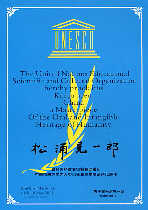 |
 |
|
| Kunqu Opera was founded before the Ming Dynasty (1368-1644) in Kunshan, Zhejiang Province. Thus it has a history much longer than Peking Opera. In the past, Kunqu was only performed for the royal or wealthy families. Its music is much softer than Peking Opera and the instruments used are also very different. Flute is used as the main accompanying instrument instead of stringed instruments. Others include Sheng, Erhu and Pipa, etc. The dialogue is more poetical and refined. Most of the stories in Kunqu are romantic.
Military roles or acrobatic actions seldom appear in Kunqu Opera. Many famous Peking Opera players are also great performers of Kunqu Opera. |
||
 |
 |
The Zhejiang Peking Opera and Kunqu Opera Art Theater was established in 1994 by merging the Zhejiang Kunqu Opera Troupe and Zhejiang Peking Opera Troupe.
As one of the most ancient operas in China, Kunqu enjoys a history of more than 600 years. The opera has experienced both highs and lows throughout the ages. But after the founding of the People's Republic of China in 1949, Kunqu experienced a noticeable boost once again. Now, it has established itself as "the forebearer of all Chinese operas" with its unique artistic attractions. On May 18, 2001, Kunqu was honored as "a Masterpiece of the Oral and Intangible Heritage of Humanity" by UNESCO, attracting worldwide attention.
The Zhejiang Kunqu Opera Troupe was established in 1955 by famous Kunqu artists Zhou Chuanying, Wang Chuansong and Zhou Guoliang. The opera was the only one of its kind at the time across the country. In 1956, the troupe staged the traditional play "Fifteen Strands of Coins," which became a great success with its high artistic achievements. As a result, Kunqu Opera troupes mushroomed across the nation, and the opera entered a new stage in development.
After "Fifteen Strands of Coins", the troupe staged a series of other plays that were also warmly received. Thanks to the efforts of the earlier-generation artists, such as Zhou Chuanying and Wang Chuansong, the troupe has brought up a number of new stars, such as Wang Shiyu, Wang Fengmei and Lin Weilin. The Zhejiang Kunqu Opera Troupe received the "Inheritance & Innovation Award" by the Ministry of Culture in 1982, and was again recognized by the Zhejiang Provincial Government in 1986.
Since the merging of the Zhejiang Kunqu Opera Troupe and Zhejiang Peking Opera Troupe, the Theater has made significant achievements in creating and staging a number of repertoires. Many plays and actors have won various honors in national competitions. The troupe had also paid performing visits to Japan, Thailand, Hong Kong, Macao and Taiwan.
 Kunqu was listed as "a Masterpiece of the Oral and Intangible Heritage of Humanity" by UNESCO in May 2001, which further propelled its development. To protect and improve Kunqu Opera, the Ministry of Culture has taken a series of effective measures, such as its 10-year scheme for the development of Kunqu Opera.
Kunqu was listed as "a Masterpiece of the Oral and Intangible Heritage of Humanity" by UNESCO in May 2001, which further propelled its development. To protect and improve Kunqu Opera, the Ministry of Culture has taken a series of effective measures, such as its 10-year scheme for the development of Kunqu Opera.
As a result, the Zhejiang Peking Opera and Kunqu Opera Art Theater was divided into two troupes in February 2003. The new Kunqu Opera Troupe consists of 90 members of high artistic achievements.
The young artists in the troupe now have successfully inherited artistic assets from artists of previous generations. Their persistent hard work will ensure the development of the opera in the new century.
Website: www.zjkjt.com
Address: No 118, Shangtang Road, Hangzhou, Zhejiang Province
Tel: 0571-85236399
Fax: 0571-85330022
Postal Code: 310014
| Repertoires |
 Fifteen Strands of Coins Fifteen Strands of Coins |
 The West Garden The West Garden |